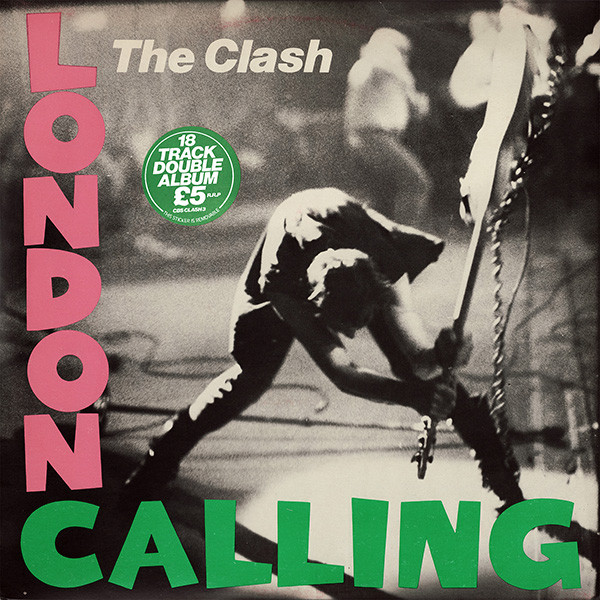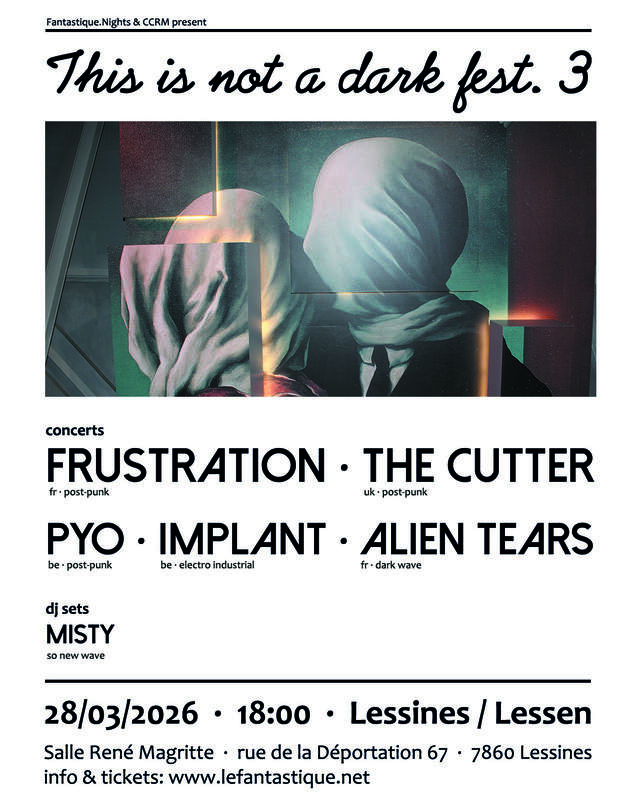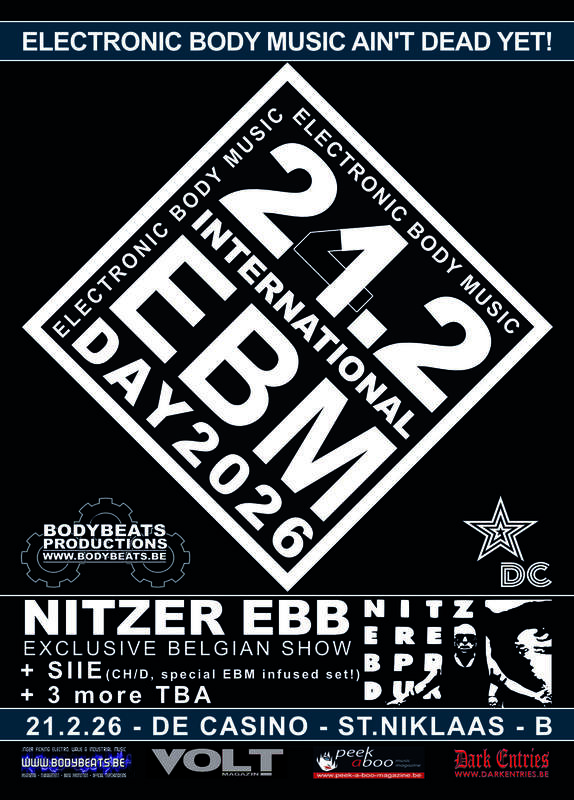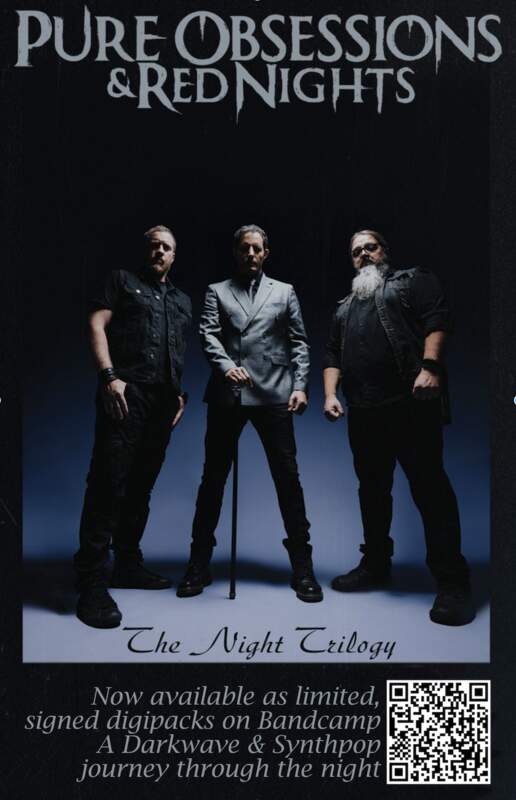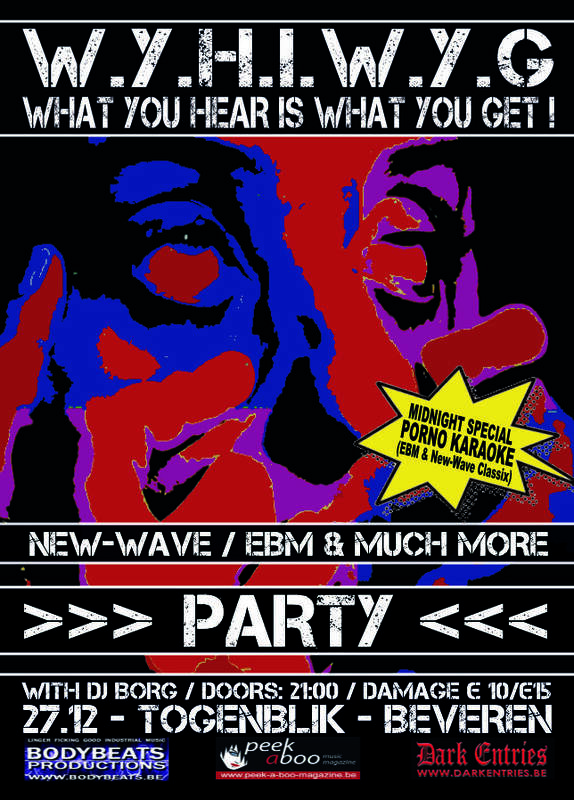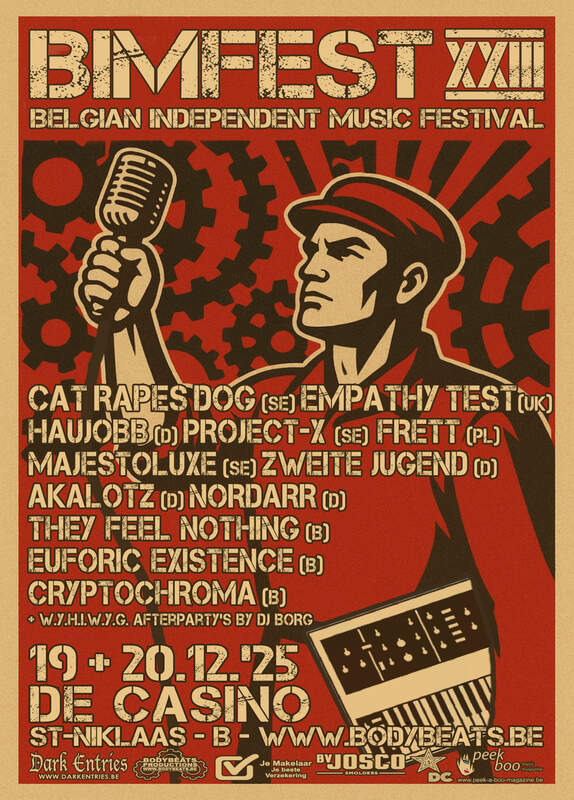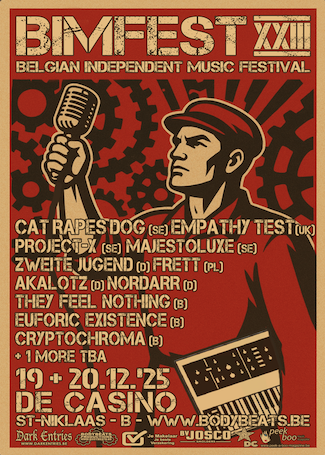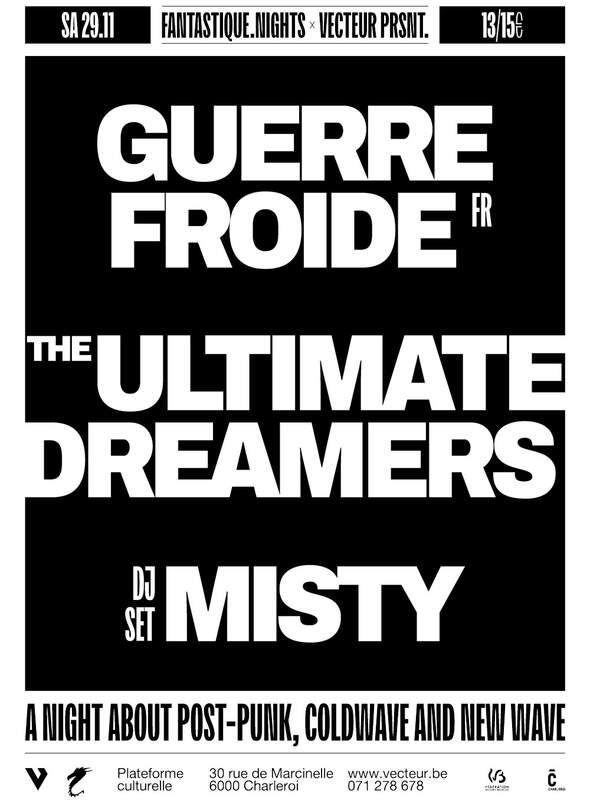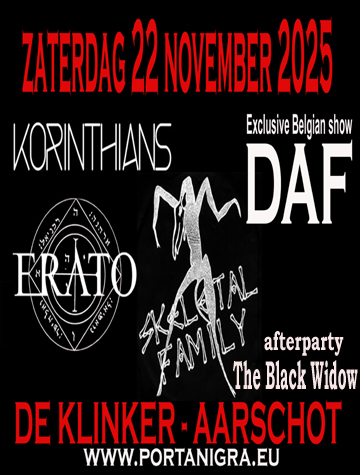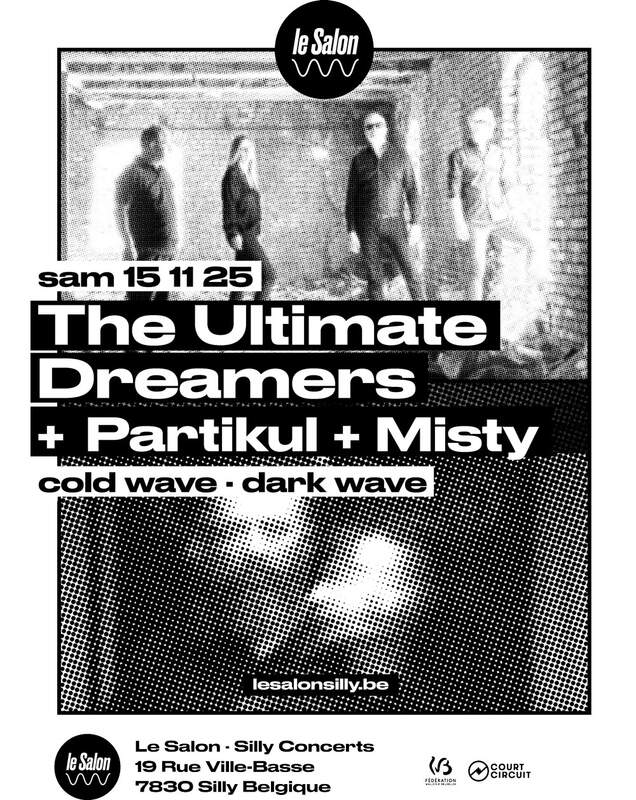By annual tradition, Bimfest takes place at the end of every year, and this year will be no different. On December 19 and 20, in venue De Casino in Sint-Niklaas, the “beats” and “bleeps” will once again come flying at you from all sides. It will arrive sooner than you think so we would like to introduce the participating acts to you one by one.
Zweite Jugend is a two-piece electro/EBM project from Osnabrück, Germany, formed by Eli van Vegas (vocals, sequences, songwriting, production) and Marcel Lüke (drums, songwriting). Their sound is minimalist, analog, raw, yet atmospheric: they often use vintage synthesizers (ARP Odyssey, SH-101, MS20), acoustic drums, voice, and percussion—and little else. Their work evokes elements of late-1970s electronic music and early EBM, but always with modern production and lyrical sensitivity.
Lyrically, the band is reflective, and Zweite Jugend often explores themes such as love, existential longing, human self-destruction, science, and the night. They usually write the lyrics first and then build the music around them. Zweite Jugend released their debut album Liebe ist Luxus in 2016, followed by Elektronische Körpermusik in 2019. Their third full-length album, Der Wille zur Nacht, marks the conclusion of a planned trilogy, further reinforcing their aesthetic of analog purity, dark atmosphere, and emotional introspection.
Zweite Jugend can be seen and heard live on Friday, December 19 at 10:05 PM. Make sure your watch is set correctly—and some people (I won’t name names) will already experience their “Third Youth” with Zweite Jugend at Bimfest!
Kurt Ingels (Dark Entries Magazine)
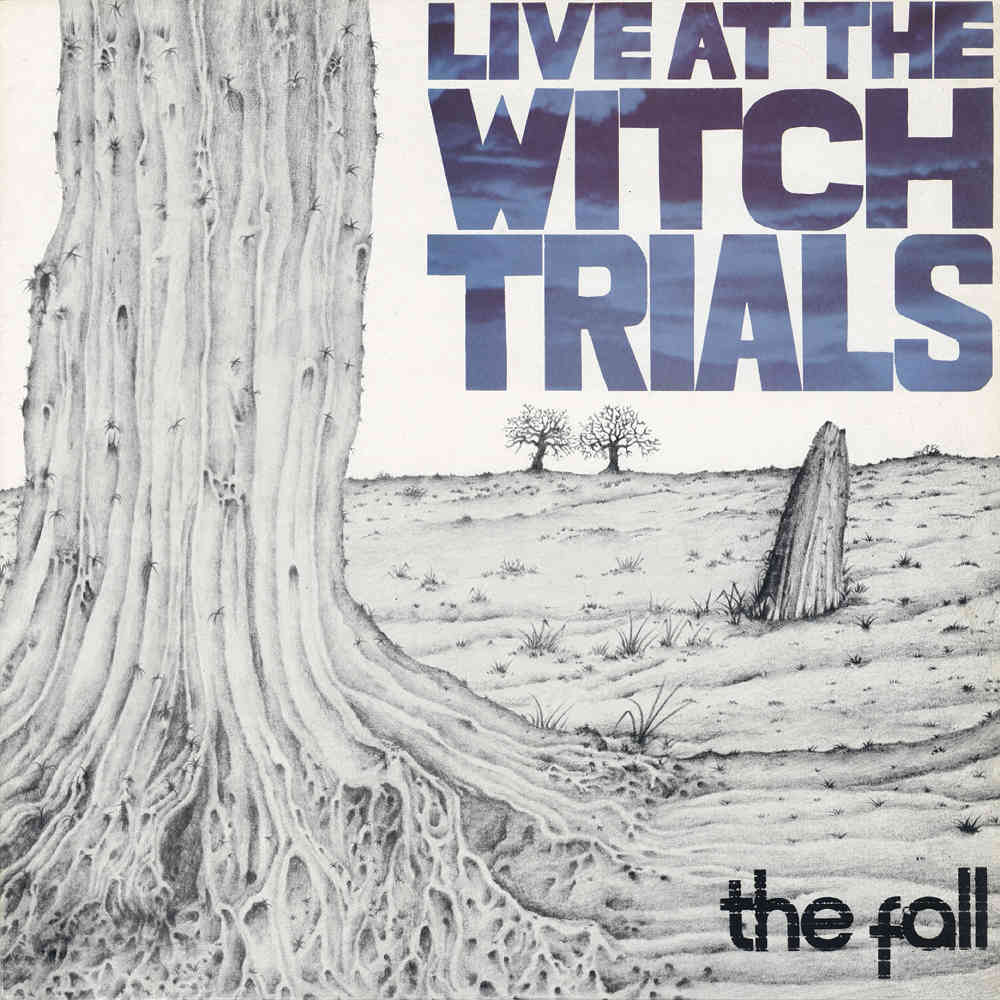
A Date In Camden | On this day 47 ago The Fall recorded Live At The Witch Trials!
This day 47 ago was The Fall entered the Sound Suite In Camden, Greater London and recorded their first long-player:
“Live At The Witch Trials”.
Although recorded in one day on the fifteenth of December and mixed the following day, the album would not hit the shops until mid March 1979.
This however was the very moment the alternative, indie and punk scene exploded under a collision curated by the late Mark E. Smith, the Mancunian rebellious wordsmith, one part Johnny Rotten and one part Ian Dury.
The man who steered this ship of alternative post-punk was as scathing as he was intelligent, not yet the commander and chief but his dominance was already in its infancy and rearing its head.
The fearless nature of the collective unit was the original mark of brilliance which made this a standout release in the late-seventies punk movement, its acts as a time capsule of both the social and economic state of Britain forty-years ago, a narrative of council estates, unemployment;”Rebellious Jukebox”,”No Xmas for John Quays”, “Industrial Estate” and of course the opener, the claustrophobic masterpiece “Frightened”.
Martin Bramah, the original guitarist is solid, melodic and at times the centerpiece, he effortlessly provides a backdrop of intensity, as for Marc Riley and his solid bass which holds the band’s direction together but it is the drumming of Karl Burn which was as wild and ramshackle as they come when it came to providing that extra menacing aspect to the music, this was the classic Fall lineup.
The extra ambiance of keyboards by that unsung hero Yvonne Pawlett was the perfect balance to Smith who, is at the very front on the mix, every word and syllable is clear, unlike later recordings, but here they are friends and comrades which adds to the easy flow of “Live At The Witch Trials”, it was never again this relaxed, this brilliant.
Frightened (Smith/Friel)
Someone's always on my tracks
And in a dark room you'd see more than you think
I'm out of my place, got to get back
I sweated a lot, you could feel the violence
I've got shears pointed straight at my chest
And time moves slow when you count it
I'm better than them, and I think I'm the best
But I'll appear at midnight when the films close
'Cause I'm in a trance
Oh, and I sweat
I don't want to dance
I want to go home
I couldn't live in those people places
Oh, they might get to know my actions
I'd run away from toilets and feces
I'd run away to a non-date on the street
'Cause I'm in a trance
Oh, and I sweat
I don't want to dance
I want to go home
I feel trapped by mutual affection
And I don't know how to use freedom
I spend hours looking sideways
To the time when I was sixteen
'Cause I'm in a trance
Oh, and I sweat
I don't wanna dance
I wanna go home
I'm frightened
Amphetamine frightened
I go to the top of the street
I go to the bottom of the street
I look to the sky, my lips are dry
I'm frightened, frightened, frightened.
Original 1979 Track List;
Frightened
Crap Rap 2 / Like To Blow
Rebellious Jukebox
No Xmas For John Quays
Mother-Sister!
Industrial Estate
Underground Medecin
Two Steps Back
Live At The Witch Trials
Futures And Pasts
Music Scene
[KB]
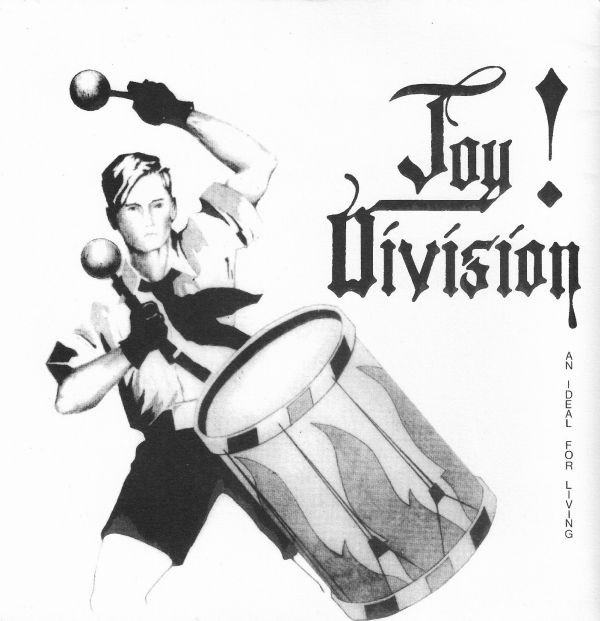
On this day, 48 years ago, Joy Division recorded their very first EP, 'An Ideal for Living'!
On this day, 14th December, it is exactly 48 ago that Joy Division recorded their very first EP An Ideal for Living (14.12.1977). In fact by the time of these recordings the band was still called Warsaw. It was released the year after on 3rd June 1978 by the band's own label, Enigma, shortly after the group changed its name from Warsaw to Joy Division. The EP was recorded at Pennine Studios in Oldham and self-financed by the band on a budget of £400 (+/-€ 450).
The original 7" version of An Ideal for Living (1000 copies) was sold out by September 1978 and was subsequently followed by a 12" version on 10th October on the band's own Anonymous Records label. All four tracks were re-released on the 1988 singles compilation, Substance.
The cover has a black-and-white picture of a Hitler Youth member beating a drum, which was drawn by guitarist Bernard Sumner. The cover design, coupled with the nature of the band's name (Joy Division was the name from the sexual slavery wing of a Nazi concentration camp mentioned in the 1955 novel House of Dolls) fuelled controversy over whether the band had Nazi sympathies. When the EP was re-released on 12-inch vinyl, the original cover was replaced by artwork featuring scaffolding.
The EP has an overall more punk-rock sound than towards the post-punk/new wave sound that their future releases would get. Founding members Hook and Sumner acknowledged forming the band inspired by and after witnessing a Sex Pistols concert.
An Ideal For Living (Track listing)
- "Warsaw" – 2:26
- "No Love Lost" – 3:42
- "Leaders of Men" – 2:34
- "Failures" – 3:44
Today, the original 7" pressing has become an expensive collectors' item and copies have been traded on the internet for over € 2,700!
On the fourteenth-of-December 1979 The Clash reached the pinnacle of their creativity with a release which still echoes not only in music but in society, a sprawling double-album which is still relevant as the band crossover the divide between Rock and Punk.
Joe Strummer channels the chaos of the apocalypse directly into the snarling opener, his venomous-vocal line, with a solid belief in every phrase he spits out;
“London calling, now don't look to us
Phony Beatlemania has bitten the dust”.
This is the perfect opener, the mindset and mood is laid out from the start, Strummer uses an almost clairvoyant warning to us of the decay that is coming;
“The ice age is coming, the sun is zooming in,
Meltdown expected, the wheat is growin' thin”.
Following this with the psycho-billy rampage of “Brand New Cadillac”, a cover of the Vince Taylor classic and used here as a two-minute bolt of energy.
The new-found reggae and dub sound The Clash started to experiment with found its way onto the album in “Rudie Can’t Fail”, whereas “Spanish Bombs” takes the bombing of hotels in the Costa Brava combined with echoes of the Spanish Civil War and in Strummers hands it becomes the setting for an all out rocker.
A very varying scope on society appears throughout the record, themes of consumerism and over-commercialism is attached on “Lost In The Supermarket”, the divide in social standings all come under appraisal, alienation and the effect on the human psyche. Similar to this is “Clampdown”, the effects of economic-capitalist ideas on the youth, The Clash never lost their punk-spirit, their ideals, all was very much intact even if the music became more refined:
“We will teach our twisted speech
To the young believers
We will train our blue-eyed men
To be young believers”.
Even the Paul Simonon composed and sung “The Guns Of Brixton” is a classic, the reggae-fused song pre-dated the Brixton Riots but already took its story from the movie ‘The Harder They Come’ which dealt with the Brixton-born son of Jamaican immigrants who gets gunned down by police.
There is a cut at the older generation of rock-stars in the incendiary “Death Or Glory”, those rockers who swore they’d rather die than get old, whereas the rock-steady based “Revolution Rock”, which was originally the albums closer is an exuberant number of pure adrenaline;
“Everybody smash up your seats
And rock to this brand new beat
This here music mash up the nation
This here music cause a sensation”.
The closing album-track “Train In Vain” after release as a single became the first Clsh song to break the U.S top-thirty, the Mick Jones sung track with a title which is slightly obscure, more to do with the rhythm sounding like a train, although it got the added on (Stand by me) title on that American single.
Across the ‘London Calling’ album there are nineteen-tracks of killer without filler, an accomplishment for an album of its length, with the instantly recognizable cover it became an instant success which still reverberates thirty-nine years later.
Tracklist
London Calling
Brand New Cadillac
Jimmy Jazz
Hateful
Rudie Can't Fail
Spanish Bombs
The Right Profile
Lost In The Supermarket
Clampdown
The Guns Of Brixton
Wrong 'Em Boyo
Death Or Glory
Koka Kola
The Card Cheat
Lover's Rock
Four Horsemen
I'm Not Down
Revolution Rock
Train In Vain
DISCOGS
As is tradition every year, Bimfest takes place at the end of the year. This year as well, on December 19 and 20 in the De Casino venue in Sint-Niklaas, the beats and bleeps will once again hit you from all sides. It will be here sooner than you think!
Nordarr, founded in 2008 by André Schitteck and Christoph Lemke (also known as Chris Dupont), has carved out its own place in the German EBM underground. Their sound is raw, analog, and bass-driven, combining relentless rhythms with loud vocals that radiate anger, protest, and rebellion. Deeply inspired by the old-school tradition but sharpened with a modern twist, Nordarr delivers music that is both uncompromising and confrontational.
On stage, the collective is known for an energy that sparks the tension of the band and turns every performance into an intense experience that embodies the true spirit of classic body music.
Nordarr can be seen and heard on Friday, December 19 at 9:00 PM!
Kurt Ingels (Dark Entries Magazine)




